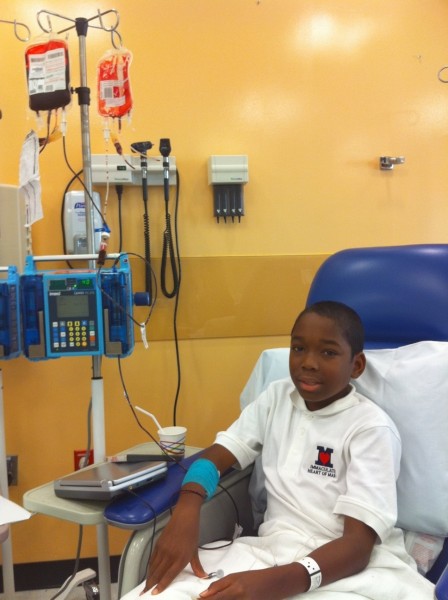 A new blood donor program for children with sickle cell disease will be starting in January 2011. The Sickle Cell Donor Program plans to have one or two volunteers a week donate red blood cells for the approximately 30 children at JHH who need blood transfusions every month. Blood donations will be performed in the Hemapheresis And Transfusion Service (HATS) Donor Center on the first floor of JHOC. We hope to recruit donors from staff and visitors here at Hopkins.
A new blood donor program for children with sickle cell disease will be starting in January 2011. The Sickle Cell Donor Program plans to have one or two volunteers a week donate red blood cells for the approximately 30 children at JHH who need blood transfusions every month. Blood donations will be performed in the Hemapheresis And Transfusion Service (HATS) Donor Center on the first floor of JHOC. We hope to recruit donors from staff and visitors here at Hopkins.
Sickle cell disease is an inherited blood disease in which red blood cells can become rigid and sticky, leading to blocked blood vessels. This process can lead to damage in many organs, including kidney, lung, bone, and brain. Stroke is one of the most feared complications of sickle cell disease, and 10% of children with sickle cell disease will have stroke by age 20. Fortunately, stroke risk can be screened for using a radiology test called a transcranial Doppler that measures blood flow in the brain. A majority of strokes can be prevented by starting chronic red blood cell transfusion for children who are shown to be at high risk for stroke. For children who have a stroke before transfusion has started, a chronic transfusion program can prevent additional strokes. Unfortunately, chronic red blood cell transfusions have to continue indefinitely in order to prevent additional strokes.
Blood donations for sickle cell disease often need additional requirements beyond routine blood donations. One-third of people with sickle cell disease need blood that has additional compatibility requirements besides the usual ABO and Rh testing. In Baltimore, nearly all people with sickle cell disease are African American. To meet the needs of the extended matching that is needed for sickle cell disease, donors should be African American because it is very rare to find these extended matches in other ethnicities. Thus, the Sickle Cell Donor Program will be recruiting African American donors. Donors will be screened to see if they are a match for a patient with sickle cell disease here at Hopkins. Those who are a match will be invited to donate again, and those who do not match will be invited to continue donating for other important needs, such as platelets and general red blood cell inventory, since all blood donors are valuable. All donors will receive snacks and a free gift after their donation.
Funded by a generous grant from the Thomas Wilson Sanitarium for the Sick Children of Baltimore, this program will help alleviate the continual strain on the blood supply that the extended blood matches cause. It would be hard to fathom not having available blood for a child in need. Overall, less than 10% of eligible blood donors donate, so by finding more donors, we hope to never have a shortage. To see if you are eligible to be a donor, call Will Savage at 4-5171 (410 614-5171).
Will Savage, M.D.